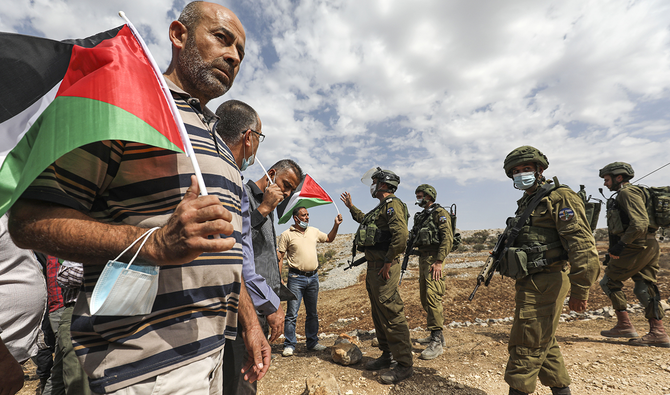LONDON: The two new co-chairs of the Britain-Palestine All-Party Parliamentary Group (APPG) have urged the UK government to “stand up for international law” by banning all imports from illegal Israeli settlements.
Julie Elliot, a member of the UK’s main opposition Labour Party and one of the two new co-chairs, also said Britain should recognize Palestine as a state.
In a message released online to mark her election to the APPG, she said: “It’s time that the British government stood up for international law, sought action against products from the settlements — ban them in this country — and also move towards helping to end the blockade on Gaza, which has brought such dreadful, dreadful suffering to the people of Gaza.” She added: “It’s time for the British government to recognize Palestine. The time is now.”
Baroness Sayeeda Warsi, the other new co-chair and former co-chair of the governing Conservative Party, said: “Palestinian rights must be continually raised in the UK Parliament. It’s vital that we continue to pressure the UK government to act to end the occupation and to stand up for international law.”
APPGs are groups in UK politics convened across party lines that meet to discuss, campaign on and promote a certain issue. They are often effective parts of wider parliamentary campaigns.
Chris Doyle, director of the Council for Arab-British Understanding, welcomed the election of Elliot and Warsi as the APPG’s new co-chairs.
“They’re two politicians who understand the Palestinian issue, and it’s really important to push things, as they both have, such as British recognition of a Palestinian state along the 1967 lines with Jerusalem as its capital,” he told Arab News.
“The Palestine APPG is one of the best supported in Parliament — that’s a sign of the interest in the issue.”
But Doyle said they may have their work cut out in getting their message on Palestine across. “The challenge right now is to give airtime to any issue that isn’t COVID-19 or the American elections,” he added.
“The conflict issues in the Middle East are starved of the sort of attention they need because of the pandemic.”
















